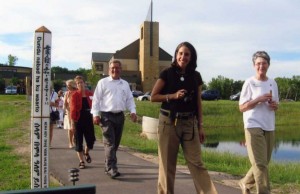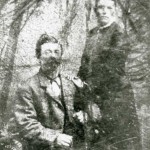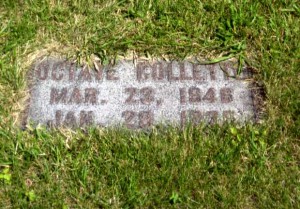#45 – Bob Barkley: Guns and America
Moderator: A previous writing on this general topic is at #3, published April 3, 2009.
Guns: Guns are used for sport. I have absolutely no interest in such sports. But as long as my safety is not seriously threatened, I believe individuals should have the right to engage in such sports and use any reasonable sporting guns they choose to.
On the other hand, I do not support guns in homes—and certainly not other than under lock-and-key – and in no way do I support assault or other military weapons in the possession of civilians. To paraphrase Bierce, “guns are instruments used by supposedly civilized peoples in order to settle disputes that might become troublesome if left unadjusted.” This points out the absurdity of violence as a means of generating peace. The use of guns indicates a reliance on force when there is little competence or inclination to rely on the power of more civilized means. I have little tolerance here, and the international data—viewed over time—demonstrates without question the ridiculousness of the US fascination both with weapons and with force.
To give a little context to this issue, “Guns Take Pride of Place in US Family Values” by Paul Harris, and published in the UK Observer on October 14, 2007 stated, “Guns, and the violence their possessors inflict, have never been more prevalent in America. Gun crime has risen steadily over the last three years. Despite the fact that groups like the NRA consistently claim they are being victimized, there have probably never been so many guns or gun-owners in America – although no one can be sure, as no one keeps reliable account. One federal study estimated there were 215 million guns, with about half of all US households owning one. Such a staggering number makes America’s gun culture thoroughly mainstream. An average of almost eight people aged under19 are shot dead in America every day. In 2005 there were more than 14,000 gun murders in the US – with 400 of the victims children. There are 16,000 suicides by firearm and 650 fatal accidents in an average year. Since the killing of John F. Kennedy in 1963, more Americans have died by American gunfire than perished on foreign battlefields in the whole of the 20th century.”
And later Harris adds, “But the key question is not about the number of guns in America; it is about why people are armed. For many gun-owners, and a few sociologists, the reason lies in America’s past. The frontier society, they say, was populated by gun-wielding settlers who used weapons to feed their families and ward off hostile bandits and Indians. America was thus born with a gun in its hand. Unfortunately much of this history is simply myth. The vast majority of settlers were farmers, not fighters. The task of killing Indians was left to the military and – most effectively – European diseases. Guns in colonial times were much rarer than often thought, not least because they were so expensive that few settlers could afford them. Indeed one study of early gun homicides showed that a musket was as likely to be used as club to beat someone to death as actually fired. But many Americans believe the myth.”
Recently it was reported that if you have a gun in your home there is 22 times as great a likelihood that it will be used against you or someone you know than against an intruder/criminal. And as the New York Times reported on April3, 2009: “Contrary to gun lobby claims, the evidence suggests that permitting concealed weapons drives up crime rather than decreasing it.”
The second amendment recognizes the need for a “well regulated militia” being the only basis for the possession of arms. With the abundance of formally organized and regulated police, safety, and military forces in the US—none of which existed at the time of the amendment—it is a huge stretch to use this amendment to suggest that it provides for random and indiscriminate individual possession of arms. It does not. And the Supreme Court, is dead (no pun intended) wrong! We must move into modern civilization and seriously regulate arms possession and use. However, the fundamental right to bear arms—as long as they cannot be used to threaten me and mine—remains a matter of individual choice and intelligence. We cannot legislate wisdom – or even common sense it appears.
And to expand on the Second Amendment arguments, it is only those who are ignorant of, or choose to ignore history, that fail to recognize that the founders were strongly set against a standing army. They considered it a horrendous threat to the future of the democratic republic they envisioned. And it was solely because they anticipated no standing army that they endorsed ordinary citizens owning and learning to use muskets so that they might be called upon to defend our country if needed.
Thus, we have ended up with two violations of our founder’s intentions: 1) the presence of a standing army of gigantic excess, and 2) the support of the people’s license to possess arms of unlimited dimension for reasons that no longer exist.
Jane Smiley, novelist and essayist, in April 2007, had this to say about the subject, “…guns have no other purpose than killing someone or something. All the other murder weapons Americans use, from automobiles to blunt objects, exist for another purpose and sometimes are used to kill. But guns are manufactured and bought to kill. They invite their owners to think about killing, to practice killing, and, eventually, to kill, if not other people, then animals. They are objects of temptation, and every so often, someone comes along who cannot resist the temptation–someone who would not have murdered, or murdered so many, if he did not have a gun, if he were reduced to a knife or a bludgeon or his own strength. I wish that the right wing would admit that, while people kill people and even an “automatic” weapon needs a shooter, people with guns kill more people than people without guns do.”
But above all else, I am swayed to my negative thinking regarding guns by the following: “In the U.S., 12 children each day die from gun violence. Homicide was the second leading cause of death for people ages 10 to 24 in 2001, with rates 10 times that of other industrialized nations.” (Source: Marianne Williamson of The Peace Alliance.) No sporting interests can trump that revelation.
I also believe that everyone that purchases or owns a gun should be forced to buy special insurance to cover its misuse or accidental injury. Why not? Isn’t auto insurance the same thing?
Individual rights—particularly when it comes to minority interests—are what our nation was founded upon and those rights must take precedence over ideological preferences. Nevertheless, it is my considered belief that many people are pretty dumb and guns have a way of helping those people prove it.



